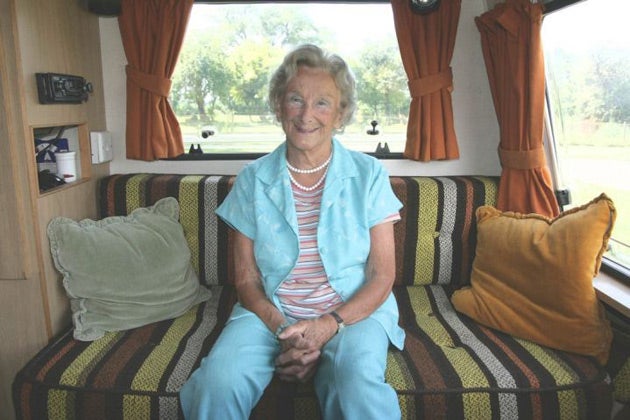Last Night's Television: A nostalgic account of suburban wanderlust
Caravans: A British Love Affair, BBC4<br />FM, ITV

I was a little startled to find that you can make an hour-long documentary about the history of the caravan without ever acknowledging the potent Proustian impact of an over-filled chemical toilet, but the makers of Caravans: a British Love Affair somehow managed it. Indeed, the only mention of bathroom facilities in the entire thing was a faintly contemptuous reference to "flush toilets" by a caravanning purist who hankered after simpler days. The explanation, I suspect, lay in the film's defiantly unequivocal subtitle, one that virtually dared the viewer to suggest that any other emotion was even conceivable in relation to these rolling roadblocks. This wasn't a programme that was going to be phoning up Channel 4 to ask if it could use a clip from that sublime episode of Father Ted in which the Craggy Island three find themselves squeezed into a rain-lashed caravan with Father Noel Furlong and his youth group. Nor was it going to ask awkward questions about the marital constraints of compressing an entire family into a space not much larger than the average bathroom. And it certainly wasn't going to interrogate the paradoxical escapism of getting away from it all by taking most of it with you. Instead, it was a sweetly nostalgic account of suburban wanderlust, pervaded by the honeyed light of summers past.
It was a distinctly upmarket pastime to begin with, a frolic limited to those who could afford a bespoke caravan and a car large enough to pull it, and there was lovely footage of those early enthusiasts, some of them towing what looked like half-timbered semis on wheels. But the boom in car ownership after the war and the endeavours of Sam Alper, "the Henry Ford of caravans", soon changed that. Alper produced the Sprite, which was half the price of most of his competitor's offerings, and then proved that it wouldn't fall apart after 50 miles by driving it around the Mediterranean. Instead of braving a Blackpool B&B, with a landlady who treated her guests like remand prisoners, holidaymakers could make up their own rules and follow their own whims. The sense of the suddenly expanded horizons this offered to people who would not have been able to pay for hotels was touchingly recalled by veteran caravanners, talking in tones better suited to a religious revelation than a holiday. "I've seen things and done things that I'd never have done if I hadn't had a caravan," said Dorrie van Lachterop, who had been bold enough to launch an early assault on Paris with hers, and still had the snapshot recording her pavement lay-up in the shadow of the Arc de Triomphe.
If the film had a problem, though, it was that there are only so many ways you can say "You can go wherever you want to" before it becomes a little repetitive, leaving you tapping your fingers impatiently on the steering wheel and thinking longingly of the accelerator pedal. That and the fact that the genuine liberty of early caravanning (you could park up pretty much anywhere) eventually congealed into the suburbs on wheels of modern caravan parks. A bit of grit and downside would have helped to vary the tone a little without, I think, betraying the affection that was at the heart of the film. But, even so, it made a surprisingly convincing case for the caravan as an instrument of quiet social revolution.
FM, a new comedy for ITV2, has one big asset and one unique selling point. The asset is Chris O'Dowd, the lugubriously droopy one from The IT Crowd, who here plays a radio DJ anchoring one of those shows in which random wittering with the production team takes up far more airtime than music. The unique selling point is the fact that real stars and bands make cameo appearances, turning up for studio sessions or interviews. In this first episode, Justin Hawkins of the Darkness was sitting in so that they could tease him about his tattoos, and Guillemots obligingly performed one of their numbers, now front of stage, now just a noise in the background as the cast cracked out a couple more gags.
The essential joke here is that O'Dowd's character, Lindsay Carol, is successful but not cool, and it's the latter he really hankers after, with, as they say, predictably embarrassing consequences. A bit too predictably, you might think. In last night's episode, O'Dowd was trying to pass himself off as a mixmaster ("I'm the Right Honourable Lord Mixalot... it's like a disease... I've got mixamatosis") with the help of a demo he'd borrowed from a new runner, and it would have been nice if his eventual exposure had come about as the result of something a little less obvious than a jammed CD player. That said, the chemistry between Lindsay, his co-host (Kevin Bishop), and his producer (Nina Sosanya) is quite promising, and the presence of real musicians gives it an extra edge. Don't touch that dial just yet.
Subscribe to Independent Premium to bookmark this article
Want to bookmark your favourite articles and stories to read or reference later? Start your Independent Premium subscription today.

Join our commenting forum
Join thought-provoking conversations, follow other Independent readers and see their replies